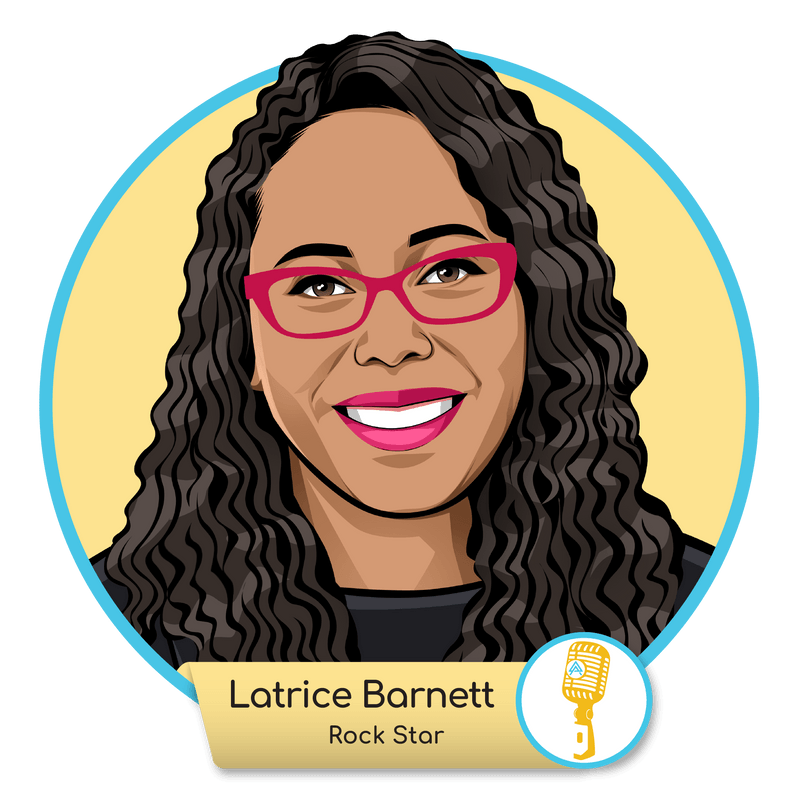In this episode, Ghazenfer Mansoor, Founder and CEO of Technology Rivers and author of Beyond the Download, breaks down how to build AI and software products people actually use, not just download.

AlchemistX: Innovators Inside
E.35 - Latrice Barnett: Rock Star
Published on
May 25, 2022
"I get more fulfillment in my everyday life when I can think about the art, the giving back, the human element of the work that allows me to show up my best..." - Latrice Barnett
Show Notes
Rachel Chalmers:
Today I'm thrilled to welcome Latrice Barnett to the show. After almost eight years with Salesforce, Latrice was a senior director and regional vice president for Partner Marketing Field Distribution. Before joining Salesforce, Latrice worked as an executive and interactive producer with the branding agencies, Cibo Studio and Odopod. She has a degree in comparative literature from UC Berkeley, and she's an accomplished vocalist whose excellent 2006 album Illuminate is available on your favorite streaming service. Latrice, it's so great to have you on the show.
Latrice Barnett:
Thank you so much, Rachel. It's a pleasure to be here. Thanks for having me.
Rachel Chalmers:
We've talked a lot privately, you and I, about how the tech industry is like the music industry and how they're different. Do you want to expand on some of those thoughts?
Latrice Barnett:
I think there are a lot of similarities. I mean, there's definitely a lot of this “Wild, Wild West” vibe, you know? I feel like the tech industry and the music world have both grown up outside of the more traditional paths. You know, they're not as regulated in the same ways as finance or as health care. So there's a little bit more flexibility with what can and can't happen, a little bit more creativity and ability to jump out and do things that are new than you would see in more highly regulated spaces.
I think at the same time, it can also be challenging. Some similarities I've seen in both music and tech. It can be challenging for people who don't fit a certain profile to break out of stereotypical roles. Sometimes people who don't fit into a certain profile can be painted as an exception as opposed to just a different path. In terms of differences, I think that one thing that I really valued and sometimes miss from the musical world is that I think peer critique is more accepted and expected in the arts as well as in music. And so I think there's more of a tendency in tech for people to look at peer review and critique as self attack, you know, which is unfortunate only because I think that you don't necessarily always… you can't guarantee that your colleagues have gone through a process where they have to separate themselves, their spirits from their actual product, you know, and so folks can take things a little bit more personally.
Rachel Chalmers:
That's a really interesting point. I think I bring that from, you know, I dabble in fiction. I've had a little bit of short fiction published and I've lived the workshop life and I do run a lot of my startup critique sessions like writing workshops. And I say, you know, we're critiquing one another's ideas and work product and we're not critiquing each other. So try to introduce that separation of the person from what they're working on. Yeah, that's a really interesting point.
And I loved your characterization of both as the Wild, Wild West because they are geographically centered in San Francisco and L.A. Since the fifties, when these industries really started going in those cities, there has been that sense of freedom from the financial centers on the East Coast and from, you know, the white-shoe law firms on the East Coast. And it's felt a lot more freewheeling and able to innovate, as you say, but also even less tractable to people walking untrodden paths.
I always like to talk about how people think large companies are more inimical to women, but then you look at Coca Cola and it's created the careers of countless women and black people, male and female, because it's a large company and it has a powerful HR organization that's not only working in the company's interests, but working to make sure that there's representation and equal treatment. And that's the kind of center of gravity I think that you're talking about, that Silicon Valley and the music industry don't have. There's no one central authority saying you can't treat outsiders badly. And so outsiders are treated badly.
Latrice Barnett:
I think they can be. I feel like there's a spectrum here, right? There's a couple of different extremes. There's kind of the folks who come at it from more traditional business in tech: “We're going to come at it with, if you don't have an MBA, if you don't wear these types of clothes, if you don't wear those funny sneakers with the white soles, you know… *Laughing*
Rachel Chalmers:
*Laughing* (I Look so bad. Guys, wake up.)
Latrice Barnett:
I mean, no judgments, but kind of a judgment. But, you know, if you're not fitting a mold, sometimes there are folks who really want to just kind of exclude you. At the same time, I think there are in both tech and in the arts, in the music industry, I think there are people who are breaking down that stereotype and not even asking questions about it in ways that I don't see as successfully in more traditional enterprises.
I think about – I don't want to name any particular artist because that'll date the podcast – There are folks who I think are doing some pretty amazing things, whether it's with gender or race or, you know, all of the different ways that we present in our lives.
Rachel Chalmers:
I think we can call out Janelle Monae. I think Janelle Monae is timeless, still relevant in 200 years.
I think it's hard to talk about any of this, though, without talking about the role that capital plays, because the kind of peer critique you're talking about, where it does arise in tech, it's because people really care about the practice more than they care about their ego. And that's because at the heart of both tech and music is a creativity that people pursue independently from pursuing money. People might want to be musicians to get rich, but they also want to be musicians because music is beautiful and meaningful and communicates. And there's that truth about software as well at the core of certain software products. And when you talk about the MBAs coming in with their ridiculous shoes, you're talking about people trying to capitalize on that and exploit and harness the surplus away from the creators. And I think that's a tension that we don't talk about often enough. I just want to throw that out to you.
Latrice Barnett:
Yeah, no, I think it's totally it. You know, I think about how there are folks who don't have a choice. You know, as a musician, I didn't have a choice but to be a musician. Just because it's not what I'm doing as my core salary or income stream. It doesn't mean that I'm not a musician to this day, you know? It is not a choice. I can't turn it off. I can't turn off being a quirky person either. This is just a part of my core. And I think that similarly, there are folks who go into software development because of the financial potential gain. But I think there are also folks who are like, “Oh, my gosh, where else could I possibly be? This is what I do.” And I think there are a lot of.. You know, what's funny is that there are so many similarities between the ways that musicians' minds think and software developers think. I think about folks that I've met through Alchemist, and thinking about how there's such a similarity, in thinking about music and the way that it allows you to kind of think three dimensionally, right? There's the written A to B part of it, but then there's also the sonic sort of layers and the experiential piece of it. And that is so much of how software is developed. I feel like that's for me, it's a template for that.
Rachel Chalmers:
And then you look at software developers who also had a career in music like Zoe Keating and Vienna Teng and some of their looping compositions which call back to Steve Reich and even Bach. Those mathematical truths at the heart of music are the same as the ones at the heart of software.
Latrice Barnett:
Agreed.
Rachel Chalmers:
What can music and tech learn from each other? How could tech benefit from lessons learned in music and vice versa?
Latrice Barnett:
This is more of a commentary on capitalism, I wonder. But I think that in tech there could be a little bit more of an art form appreciated. You know, sometimes it's not about the monetizable value, it's about what the need is. And that's very idealistic, I get it. But that's my musician side talking. I also think that one thing that I find is that musicians as a forcing function of performing have to know their audiences. There are certain people in tech who get that, but that is not as widespread. Like, you cannot be a musician without understanding your audience, at least not an active musician. You can be creating music for yourself, but you can't be creating it for anyone but yourself without understanding your audience – especially when it comes to performance. And I think that that's a hard thing for folks to realize in tech, especially when they don't come from an artistic standpoint.
So, to me, I think that that's a major parallel is understanding – I'm going to say it three times – understanding your audience.
Rachel Chalmers:
A huge part of what we're doing in Alchemist, and particularly AlchemistX, is promoting this doctrine of customer discovery. And it is revelatory when people really jump on top of it. But you're right, it's the kind of intuitive connection that performers have programmatized and laid out in a way that folks from outside the creative industries can start to access it.
It does touch on the values beyond capital as well because, quite often, in the course of customer discovery entrepreneurs will find a need that needs to be filled that they become very passionate about, that potentially won't throw off a huge income stream. And you have a choice as a startup supporter, whether to push founders in the direction of these for-benefit ventures rather than for-profit ventures. And. I'm really grateful that at Alchemist we do have the breadth of understanding in our management team to encompass things like our Community Safety and Wellness Accelerator up in Alberta.
Latrice Barnett:
Yeah, I think there's an importance. I mean, I think there are companies who do this well who you know, obviously there's a certain reality, the world in which we live, we do need to make capital. But I think that there's also certain things that can be explored. You know, there's a certain creativity that happens when people are like, “OK, if I spend four days/four and a half days of my week focusing on what makes money, can I spend a little bit of time focusing on just what is interesting and if there's a need?” Because sometimes those things can turn into monetizable things if needed, but they're such a great way of exploring where our minds can go and how we can meet our needs better.
Rachel Chalmers:
And I know you're coming off the end of your time with Salesforce, but I have to say, Benioff is the least worst billionaire I ever met. He still seemed like an actual person. Yeah. And he was a pioneer, really, in building a company that's immensely profitable, but also has something of a social conscience.
Latrice Barnett:
That was really important to me. It's funny because before I joined the company, I thought it was… I'd had Salesforce as a client in the various agencies that I'd worked for and had this kind of… my only experience was seeing the impact of Dreamforce on San Francisco, and not being able to get a reservation at the restaurant that I wanted to go to on a particular night of the week or whatever. And I had kind of like a very, “Ugh, they're like any other company.” And it was when I got on the inside that I was like, “OK, there is a little bit of a difference here. There is a real effort to give back in ways that a lot of companies talk about and few actually accomplish on the same scale.” So I appreciate that a lot. And I think that has allowed me and encouraged me to think more broadly about ways that I can be impactful in my community and know that it's actually contributing to my overarching ability to show up in my job.
Rachel Chalmers:
Yeah, it shouldn't be an “either or.” It should be a ”both and.”
Latrice Barnett:
And that's lovely. I mean, it's interesting because I think that so many companies, again, we all get… I think folks get rewarded or feel that they are rewarded most when they just put money ahead of everything. And that's fun, you know, like some people are just wired that way. But I think that for me personally, I get a little bit more fulfillment in my everyday life when I can think about the art, the giving back, the actual human element of the work that allows me to kind of really show up my best when I'm thinking about the money-making aspects.
Rachel Chalmers:
There really are some things you cannot put a price on.
What are you planning to do next?
Latrice Barnett:
So I have joined a smaller company. I feel like I kind of do this ping pong in my career. You know, I start big and I go small and then… you know, there's one company that I joined when they were pretty early and then they grew very quickly and got very big. And, you know, it's… I think about it in terms of left brain, right brain. I get to please all sides of my brain, you know, every few years. And so I'm going to a smaller company, a much smaller company. I think it's 0.01% of the size of Salesforce currently. Which is really, really thrilling. But it's a small company. Should I name them here? Is that OK?
Rachel Chalmers:
Sure!
Latrice Barnett:
All right. I'm going to a company called Crossbeam and they are just a smaller but exciting company. I think their product is amazing and I'll be their chief of staff, which is a really exciting and dynamic role.
Rachel Chalmers:
That's a fantastic role for you. I love what you said about using the left and right sides of your brain, because startups really are about generating a new thing into the world and then large companies are about maintaining that thing. And it's really a unique personality profile. The corporate innovator who can work on both sides of that line. I do not thrive in large companies. I don't maintain things well, but I build stuff all the time. So I’m really in awe of somebody who has both of those skill sets and the chief of staff role is where that really comes out to play.
Latrice Barnett:
Yeah, it's exciting. I get to build. So I love to build, but I also love to… I can maintain things and I've been in roles where that's been my job, and I find that Zen space you have to be in in order to just keep the lights on. But I think what's really exciting about having a chief of staff at a company this small: there is plenty of opportunity to build things and set that process and then give it to somebody who's able to maintain them and help it thrive once we get it up and running. I'm excited to be the kickstarter and then share the responsibility with someone else to run, run things so that I can kind of keep turning on the lights in the building and seeing how, you know, seeing how fast we can grow.
Rachel Chalmers:
It really is that touchpoint where, you know the processes that are necessary for a large organization to run and you are the one who is building them for this small organization that's been doing everything by the seat of its pants up until now. It's an exciting moment.
Latrice Barnett:
It is. And I think one thing that I'm really excited about is having been at a few different larger companies and seeing… Larger companies are amazing, they are feats of nature, and I have utmost respect for the challenges that have to be overcome at these different scales of growth, these jumps that you have to push through. And having seen companies, a few different companies now push through getting to 100 people, getting to 1000 people, getting to 10,000 people. And these orders of magnitude that shape that. Groups of humans act differently at these different stages. I think we all know that. And so seeing the types of decisions that you make early on and how they can impact/have these long-reaching outcomes and I'm excited.
There are so many times I've been sitting at Salesforce or at other companies in my past, I'm thinking, “Hmm, here we are at this juncture.” And I can literally play it back and see how this decision down here impacted where we are sitting today. And, “Gosh, if we'd known then what we know now…” And so now I get to sit at this earlier stage company and say, “OK, these are the forks in the road that I know to look for.” And there's going to be some that I miss because, you know, every organization, every group of people, every product is different. But I'm super excited to say, “OK, if we go left instead of right here, can we set ourselves up for better or different success down the line?”
Rachel Chalmers:
It has such a powerful cultural legacy. The decisions that are made at this stage become part of the mythology of the company.
When you look back on your career to date, what are you proudest of?
Latrice Barnett:
Growth. My personal growth, honestly. I think that I have aimed to grow over time as a thinker and as a leader and as a colleague. I think those are three different things, three different directions, that have been important to me to grow in. I think like many people when I was younger, I was very focused on myself and my own, whatever was going on in my mind when I was in my early twenties. And, you know, and that's... I look back and I think, “Wow, I'm glad I'm not that person anymore.” I'm glad I'm able to think about my impact on colleagues. I'm able to think about things more deeply and kind of a little bit more multidimensional as opposed to, “Ugh. I don't really feel like sending this email right now. I'm going to do something else. I'm going to walk and get a coffee,” or whatever. And also thinking about how I've grown as a leader, I feel like I've always kind of been – A leader doesn't necessarily mean a manager of people. It's kind of like a mentality. Right? And I think when I was younger, I tended to lead by saying, “Here's what I want to do and I believe in it. And so therefore it's right,” which was probably important for, you know, for the calcification of my ego, but less useful for working with other human beings. And so as my calcification of ego shrank into not my number one priority, I think that allowed me to grow as a leader in thinking, “OK, leading isn't just like having the right idea. It's actually stopping and listening and giving voice to the people who might not speak up next to me.” Right? That is my gift as a leader, just to be able to shut up and listen to the folks, the other smart people in the room, and then help us all to come to the right decision together as a group. So that is the kind of growth that I'm most proud of.
Rachel Chalmers:
I think those are really recognizable developmental stages as well. I think the ruthlessness of one's twenties is just trying to find one's place and one's people. You know, you're jettisoning the past and you're setting out into a new world in order to find a place. And then in your thirties and forties, you look back and say, “Well, this is the place that I want to be. And so I better start listening. I better start paying attention to the people here.”
Latrice Barnett:
Yeah. And you look at who has lasted the longest. I think cranky folks who may not be the kindest people make the most noise and show up first when you join an organization. But when I look at who has lasted with the type of reputation that I admire, those are the folks who aren't necessarily yelling and throwing staplers at their underlings. It's the folks who are listening and elevating the bright minds around them.
Rachel Chalmers:
Yeah. The secret of leadership is hiring people who are smarter than you, listening to them, and then acting on their advice. And suddenly you look like a rock star.
Latrice Barnett:
And not just smarter than you, but fully different from you fully. You know, I think that I'm really embracing this whole idea of people, this diversity of perspective, you know? And it doesn't just have to do with, “Oh, I went to a different Ivy League school than you.” It really has to do with: “I come from a fully different walk of life. I have a totally different way of showing up in the world than you do. And I have totally different needs and draws on my personal life that are impacting the way that I think.” And it's that [mindset] that allows us to have just the best and most broad experience and the best minds, I think.
Rachel Chalmers:
Yeah, it's the difference between a monoculture and a redwood forest.
If you had one do over, what might you do differently?
Latrice Barnett:
Just one, huh? I honestly would have stood up for myself and things that I believe in sooner. I went through a long period of self doubt where I really believed the things that people wanted to believe about me, or at least questioned. “Maybe they're right. Maybe I'm not that smart.” I would have definitely stood up for myself much sooner than I ended up doing. I'm glad I did it eventually. And maybe that's the path that I needed to be on in order to... Because it was when I started standing up for myself and not giving a rat's ass about what's the worst that can happen? If I speak up for myself I lose my job? I didn't want that job if that's the price. And then having that kind of freedom allowed me to also speak up for other people.
Rachel Chalmers:
Yeah, it has to come from a place of surplus. You can't do it when you're feeling threatened.
Latrice Barnett:
Right? And just realizing, like when I realized I'm not scared of the threat, that was freeing.
Rachel Chalmers:
You have to get to that point, though, where you're willing to lose the job. And that's that's hard. And it's getting harder because of precarity.
Latrice Barnett:
Right. And I mean, also, that is a privilege that I have worked for. But it is still a privilege because not everybody has the ability to be like, “Yeah, worst case scenario, I lose this job.” That could be literally taking down an entire family or community if certain people lose their jobs. So I get that. I have set up my life and have a partner and a family and means to be able to support that kind of perspective. But I think that when we can… when we can do that, when we can set ourselves up, whether it's shrinking down our expenses if we can (which is also a privilege standpoint) but setting up our lives so that our jobs are working for us instead of we are working to to maintain our jobs, I think is ideal.
Rachel Chalmers:
And that's the point of having privilege. It's not to keep it and to keep yourself safe. It's to use it and to try and make other people a little safer as well.
Latrice Barnett:
And bring folks along for the ride. I'm like, if I can help other good people, smart people drive that kind of empowerment for their own lives, that's what I'm here for.
Rachel Chalmers:
How would you distill all of this experience into, say, two or three lessons for our listeners?
Latrice Barnett:
I think it comes down to a few things for me. Listen to how your colleagues make you feel. That's really important. Not to say that we should all be working among our best friends. You know, I think if I worked with my best friends, there would be a lot more partying than working because they're my best friends, perhaps. Either that or they wouldn't like me because I'd be in Latrice work mode and I'd be like, “No, we're going to do this, we're going to do that.” And they'd be like, “You used to be so fun.” But listening to your colleagues and how they make you feel, I think, is still important because when I have worked with folks who don't make me feel valued, that's when I stop thriving. And I think that's a really important thing to listen to yourself. We are trained to kind of be like “Power through, power through, power through; work at all costs, keep the job,” and that's not always the answer. So listen to how your colleagues make you feel.
If you're in a if you're in a toxic environment, do what you can to get out because that's healthy for you. Take the time you need to be successful. It doesn't necessarily have to follow a path that looks like everyone else's. I mean, I've had folks that in an interview have called it – I don't know if they thought they were calling me out or something by being like, “So you were a musician for a long time. What makes you think you can do tech?” And it's what makes you think I can't? You know?
HELLO. I'm not trying to be a medical doctor. I'm not trying to do surgery on anybody. I am literally trying to find other ways of adding value to my community. And there are so many different ways to do that. And not everybody has to have the same path. I remember feeling like maybe I should be doing these things or getting these types of letters behind my name or blah, blah, blah, blah, blah. And not everybody has to go that path in order to find success and fulfillment. I think it's curiosity that gets you there. I think it's listening to what is inside your heart and doubling down on your path to get there.
Then I think the other piece is, you know, that curiosity that I mentioned, asking questions and. Asking questions and playing back what you hear. So much of what I've been able to accomplish in my life so far has been because I align with people and I aim to… I'm like, “Here's what I'm hearing from you. Is that right?” And not only does that allow me an opportunity to say, “Did I hear this right?” And for folks to either correct or confirm, but it also kind of drives connection and allows you to really make sure that you know who is going to help you on your path and who might be on a different path themselves.
Rachel Chalmers:
Yeah, you definitely don't need any more letters after your name. Literature covers it. CompLit is a terminal degree. It sets you up to learn everything else.
Latrice Barnett:
Yeah, I think so. Yeah, yeah, totally! I remember having folks that were just like, “Literature? What are you going to do with that? You know? Oh, you're going to be poor for the rest of your life. And it's like, “No, I've learned how to think. I've learned how to tell a story. Which is a huge part of what we do every single day. So I think analytical thinking is good.
Rachel Chalmers:
How do you avoid burnout? Do you avoid burnout?
Latrice Barnett:
It's a journey. I think at this point in my life. I used to think I was so exceptional and different and I'm not like anybody else. But I think for me the magic combo is getting enough sleep, going to bed at a decent hour and having a standard schedule, exercising regularly, eating right, and then spiritually prioritizing my family, seeing friends and prioritizing activities that are important to my spiritual and creative growth. That's what I need. It's those six things. So that's how I try to stave off burnout. Sometimes I put too much on my plate, and in which case something gives. Usually it's exercise, to be quite honest. But I also notice how that has a domino effect on other aspects of my life. And I want to be number one, I want to show up as well as I can for my kids and my family. So that is a big, compelling piece to keep that balance going.
Rachel Chalmers:
What are the early warning signs for you? How do you know you're coming off the rails?
Latrice Barnett:
I mean, my exercise stops getting prioritized. More glasses of wine in the evening. And I find there are times that (I mean, sometimes and I'm not talking about cycles where you're like, ”I have to be in a high delivery mode for about a week or two.”) But I think that my whole healthy perspective goes sideways and then I start to get a little bit negative and then I think, “OK, I gotta make some changes. I got to get back on the things that are healthy and good for me. I'm not making enough music or I'm not cooking enough or I'm not hunkering down and having downtime with my family enough.”
Rachel Chalmers:
What is the best way for our listeners to connect with you or to follow your work?
Latrice Barnett:
Gosh, that's a great question. I think LinkedIn is always somewhere that I put bits and bobs. I'm not religious about it, but I think it's a nice spot to kind of showcase the major things that I'm excited to publicize.
Music. Musically, I think I'm doing some stuff here and there. I'm in a creating pattern as opposed to a sharing pattern right now. But generally, when I'm releasing music, it is on things like Spotify or CD Baby.
Rachel Chalmers:
What does the future look like for you personally? We've talked a little bit about CrossFit and what else do you have planned?
Latrice Barnett:
Gosh, that's going to be… I mean, taking on a new and expanded role is always going to be a big push professionally. That's going to take up a lot of time and energy.
I'm learning how to play piano, so that's exciting. I've been taking lessons for several months and really digging into some – re-falling back in love – with music theory. I go in and out of it and really kind of dig into that. I have a personal goal of learning SQL this year, so, you know, it's fun. Maybe digging into some python because that's my brain. So little things like that and just being a better cook.
Rachel Chalmers:
So I'm making you chief of staff of the entire tech industry. For the next five years, every decision gets made in a way that you would approve of. What will the world look like five years from now?
Latrice Barnett:
Hmm. Oh, man, that would be glorious. All the boards, all the executive leadership teams, have true variety: Diversity of thought. Diversity of perspective. Diversity of. Appearance. There are… Gosh, if it were up to me, I would honestly put a lot more women in charge. Women of color too. Yeah. I think that's one thing that would be visible, a visible shift. And I say, I mean the expansive, inclusive women term. I think I would also really, really fight to put a lot of empathetic processes in place to replace some of the patterns and the habits that our culture has fallen into.
Rachel Chalmers:
I mean, we're coming off, what, two and a half years of. Enormous scale societal trauma. I don't see how we move forward without empathy and without acknowledging the damage that we've taken on.
Latrice Barnett:
Indeed. Indeed. Yeah, I think there's a lot of healing. But before the healing, there has to be this acknowledgment of. The fact that we're kind of busted right now, you know, so, you know, whether we're talking about tech or whether we're talking about society at large, I think there's a lot of healing that needs to happen. Yeah.
Rachel Chalmers:
What else should I have asked you?
Latrice Barnett:
Gosh, I think you asked great questions. I can't think of anything else that you should have asked me.
Rachel Chalmers:
It's been so delightful to have you on the show, Latrice. Really looking forward to your next album. Really looking forward to hearing about the chief of staff role as it expands. We'd love to have you back and thank you so much.
Latrice Barnett:
Thank you, Rachel. Great to be here. Always, always a thrill to talk with you.
References
Salesforce Where Latrice was senior director and regional vice president for Partner Marketing Field Distribution.
Cibo Studio Where Latrice worked as an executive producer before her time at Salesforce.
Odopod Where Latrice worked as senior interactive producer before her time at Cibo Studio.
Illuminate Latrice’s 2006 album.
Zoe Keating Developer and Musician mentioned by Rachel.
Vienna Teng Developer and Musician mentioned by Rachel.
Crossbeam Where Latrice recently started as chief of staff.
Intro and Outro music composed by: www.PatrickSimpsonmusic.com
Recent Episodes

Why Most Corporate Startup Partnerships Fail And How Founders Can Think Big From Day One
Startups and corporates need each other. But most partnerships fall apart. In this episode, Ian Bergman talks with Noga Tal about what actually makes these relationships work.
.jpg?width=767&name=IIS7%20SQ%20Thumbnail%20(1).jpg)
How Amazon’s Innovation Framework Can Transform Your Startup
In this episode, Marcelo Calbucci breaks down the innovation habits that shaped his career at Microsoft, Amazon, and across six startups. He explains why small, fast iterations beat big plans, how narrative-driven strategy unlocks clarity, and why today’s founders should embrace niche, hyper-specialized solutions.
.svg.png)








